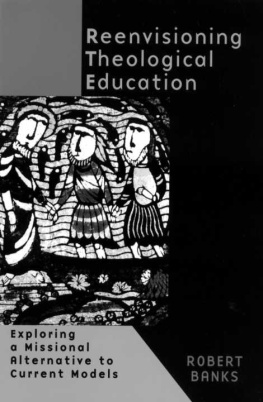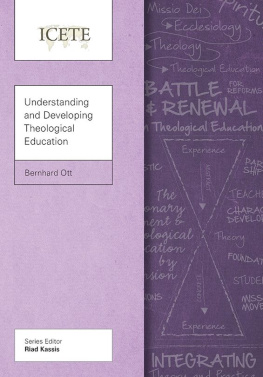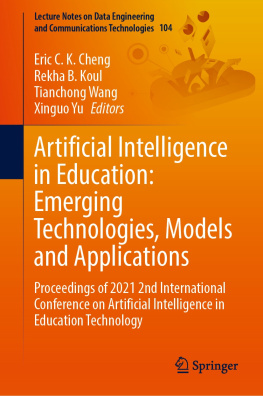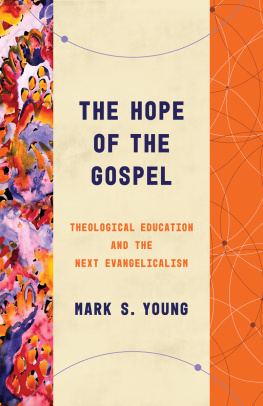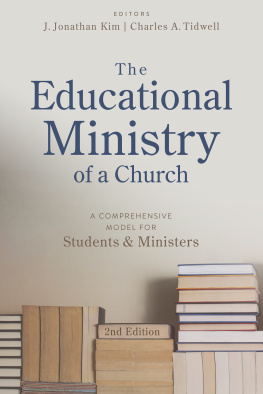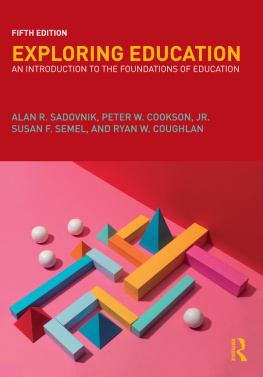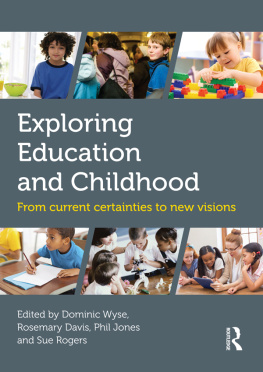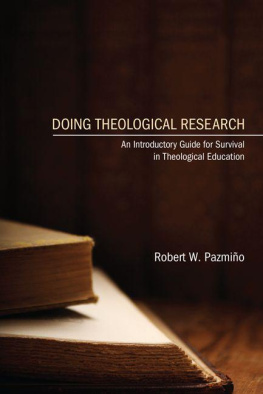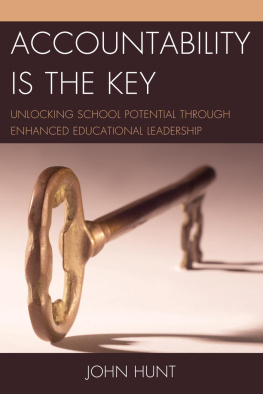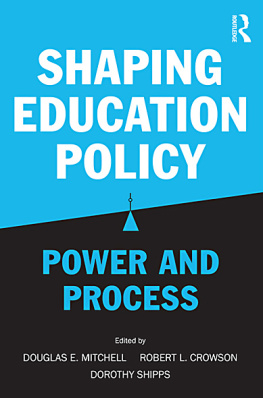REENVISIONING
THEOLOGICAL
EDUCATION
REENVISIONING
THEOLOGICAL EDUCATION
Exploring a Missional Alternative
to Current Models
ROBERT BANKS



Contents
xi
PART ONE
REASSESSING THEOLOGICAL EDUCATION: THE PRESENT STAGE OF DEBATE
PART TWO
BACKING INTO THE FUTURE: A BIBLICAL ANGLE OF VISION
PART THREE
DEVELOPING A MISSIONAL MODEL: FROM THE MARGINS TO THE CENTER
PART FOUR
BRINGING ABOUT SYSTEMIC CHANGE: SOME GUIDEPOSTS TO REFORM
CONCLUSION
Acknowledgments
I would like to express my thanks to a number of people with whom I had early conversations about this project. In particular I am grateful to Barbara Wheeler and Robert Reber, of Auburn Theological Seminary, during a sabbatical on the East Coast. Also to John Drane, of Stirling University, during his time on the West Coast and at his home in Scotland.
I also appreciate the discussions of various groups who read or heard some of this material. These include a Practical Theology Doctoral Seminar, Restaurant Theology Group, the Ministry Division and School of Theology at Fuller Theological Seminary, a Lilly Endowment-funded Seminar on Evangelical Approaches to Theological Education involving a range of scholars from around the country, and the New Testament Postgraduate Seminar at the Department of Theology in Durham University.
I am also grateful to individuals from my own and other theological institutions who looked at the whole manuscript and commented on it. Thanks here to Ray Anderson, William Dyrness, and Rob Johnston of the School of Theology at Fuller Theological Seminary, to Charles Van Engen of its School of World Mission, and to Linda Cannell and R. Paul Stevens of Trinity Evangelical Divinity School and Regent College, Vancouver, respectively. Thanks also to Dieter Kemmler of the Evangelischer Seminar, Aarau, Switzerland, and to Stephen Barton of the Department of Theology, Durham University, UK, for critiquing the biblical section in detail.
In addition I would like to thank Chuck Metteer, one of my doctoral students, for creating the index; my research assistant, Simon Holt, who worked carefully through the material detecting and correcting errors; as well as Susan Wood, Terry Latin, and Alex Pak, who turned my inadequate word processing efforts into an excellent manuscript.

Introduction
If institutional reality could be remade to heart's desire, what would the ideal theological school look like?
In my early twenties, shortly after I had graduated from an evangelical Episcopal theological institution, one of the professors asked me whether I had any suggestions for improving what took place there. My experience of seminary was mainly positive. I was introduced to the Bible in a compelling way and came away with a detailed and organic understanding of its contents. At their best, courses were theologically demanding and provocative. Since it was a residential college, there was an emphasis on community, and over my three and a half years' stay I made several lifelong friends, one of whom was on the faculty. Spirituality was important, manifesting itself in daily corporate worship and weekly small groups, as well as in numerous informal settings. Since we had to spend twelve hours each week interning in a local church - leading worship services, teaching and preaching regularly, starting and running groups, doing pastoral visiting and counseling - we gained a wide range of practical experience. I did make some minor recommendations in response to the question. Not all the lecturers were of the same standard. Some sermons and classes were better than others at presenting implications for ministry. There were restrictions on how often you could get together with friends and fiancees inside or outside the college. Supervision of our weekend ministries varied in quality. But on the whole there was not much I wanted to change. My sense was that those who taught there had largely gotten it right.
Within a couple of years, however, my view had changed, partly as a result of engaging in pastoral ministry in a large city church, and partly as a result of starting to rethink what church and ministry were all about in the light of biblical perspectives and contemporary challenges. I began to realize that my theological education had required me to learn too much too soon. Its pressurized approach had left too little time to think through and evaluate some of the views our teachers had expressed, or to work out how and where to put them into practice in an effective way. By my early thirties, after more extensive and demanding pastoral experience, as well as serious investigation of authentic ministry and church life, my questions about the best forms of theological education had sharpened and increased. Central to my concern now was a broader approach to theological education that included thoughtful lay people. Around the edges of postdoctoral work and then university teaching, I began to explore more nonformal and informal ways of doing this combined with elements of a more traditional approach. In a sense, I was rediscovering an earlier mode of theological education in which a student spent significant time with a mentor, learning from him or her both theological content and ministry skills.
In my early forties I moved out of academia into a more flexible form of ministry that combined teaching and doing. Although I taught occasionally at a small local seminary, one that was more progressive in its approach to spiritual and vocational formation, and led adult education courses under university auspices for anyone who was religiously open, these were not at the center of my efforts in theological education. On the one hand I initiated a project in nonformal theological education through meeting regularly over several years with marketplace believers in their workplaces as we addressed issues they were facing in a practical theological way. This happened with a number of occupational groups. On the other hand, a few people began to look for an alternative to seminary education, which they regarded as too oriented to pastoral ministry for their lay needs and too focused on cognitive learning at the expense of personal development and practical experience. Out of this grew an experiment involving a group operating largely as a cohort, committing themselves to gaining a basic theological education, and seeking to combine and where possible integrate intellectual, spiritual, and practical formation. In this group we learned together in a highly participatory way, fellowshiped and worshiped together in smaller and larger groups, and undertook ministry as a team in various church, nonprofit, and marketplace settings.
Over the last ten years, somewhat to my surprise, I found myself drawn full-time into a large seminary setting. The ongoing challenge here, in a place that was mostly conducive to flexibility, change, and innovation, was how to translate what I had valued out of these nonformal, sometimes experimental approaches to theological education into a larger, more structured setting. Also, how to help that institution as a whole move more in some of these directions so that it remained on the leading edge of theological education in the face of new circumstances and an increasingly diverse constituency. Everyone who teaches theology has a picture of what theological education ideally should involve. This book contains mine. But I do not set this out idealistically; I talk about concrete ways it can be realized. It is therefore a blend of theory and practice, of theology and strategy, of ideas and recommendations. Indeed it challenges not only the separating of these different modes, but delineates some of the attempts in the debate on theological education to bring them together. For, as someone said years ago, there is nothing more practical than good theory; every effective course of action contains a theoretical dimension. Why write yet another book about theological education when there are more than enough books on the subject already? I have done so for the following reasons.

